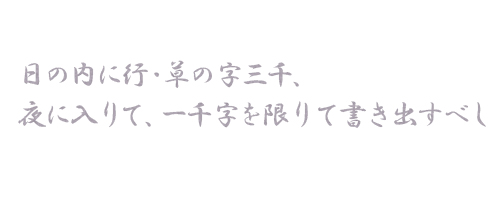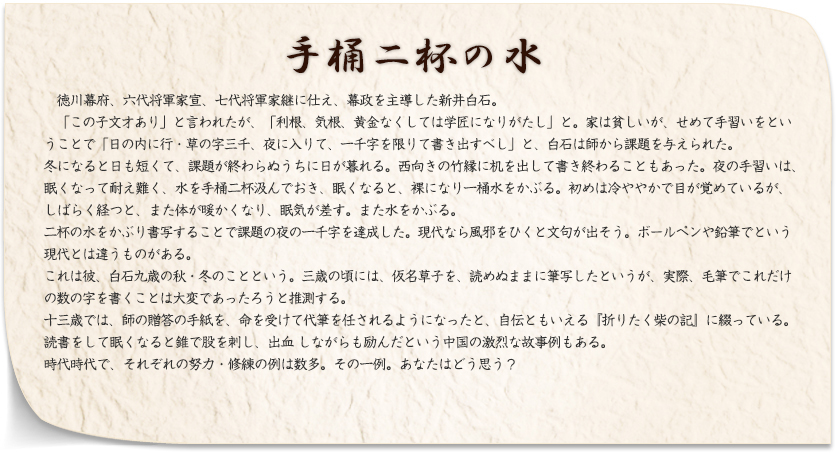Home > 一語一得 / One Story, One Lesson

Arai Hakuseki (新井白石) was a senior Minister in the Tokugawa Shogunate, serving both the sixth and seventh Shoguns, Ienobu and Ietsugu Tokugawa.
When he was a child his master noted that Hakuseki had a special talent for writing but told him: " It is difficult to become a true scholar without intelligence, patience and money".
Although Hakuseki's family was poor, his master encouraged him to learn to write. "During the day, write three thousand characters in semi-formal (gyo 行) and cursive (so 草) styles; once it is night, write a thousand characters more," the master said.
It was Autumn when Hakuseki began his task and the days were already getting shorter. He found that the daytime was too short and night was falling before he could finish his assignments. He moved his desk to a veranda facing West, to catch the evening light so that he could complete his exercise but at night he found it difficult to stay awake. So he took two pails of cold water and, whenever he felt sleepy, he would pour the water over himself. At first the cold would keep him awake but, as he got warmer, he would become drowsy again so once again he poured the cold water over himself to keep awake and alert. In this way he completed the task of writing the 1,000 characters every night.
To us, today, this might seem very severe. Of course, it would also be easier for us nowadays, using ball-point pens or pencils rather than having the lengthy chores of grinding ink and cleaning writing brushes.

This story was meant to have taken place in Autumn and Winter when Hakuseki was nine years old. It is also said that when he was only three he would copy out story-books even though he was unable to read what he had written. We can imagine the difficulty , for a child so young, of writing so many characters with a brush.
In his autobiography, "Oritaku Shiba no Ki" (折りたく柴の記), Hakuseki says that by the time he was thirteen years of age, his skill at writing was such that his master would ask him to write letters on his behalf.
In a Chinese account there is another extreme example of a man who became drowsy while studying. He would pierce his thigh with a sharp gimlet until it bled to keep himself awake.
Throughout the ages there are many examples of those who made great efforts such as these to train themselves. Hakuseki's is just one such story. What do you make of it?






